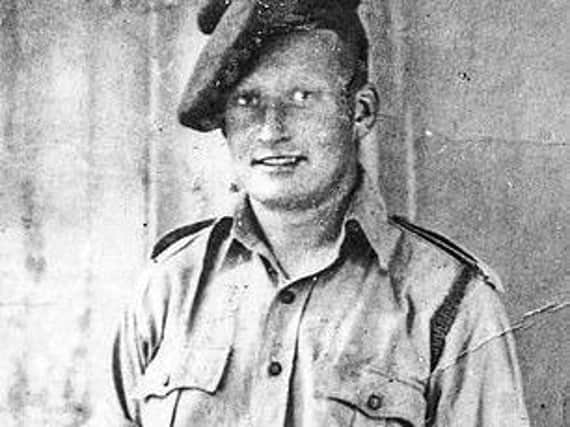Author tells extraordinary tale of Wigan SAS soldier in new book


The book tells the story of a remarkable special services patrol, including Corporal Jones, which was dropped behind enemy lines to disrupt the German army as it advanced on the Normandy beaches to meet the D-Day Allied landing forces.
They were captured, tortured and sent to the woods outside Paris to be shot in a night-time execution ordered personally by Adolf Hitler.
Advertisement
Hide AdAdvertisement
Hide AdHowever, having already excelled in the field and shown incredible courage and bravery, Corporal Jones was one of two men who managed to escape their killers.


He lay playing dead on the ground which made the Nazi officers think they had already shot him.
His extraordinary story and character now shines at the heart of Dorset-based author Mr Lewis’ account of his patrol.
Mr Lewis said: “Jones was originally a miner. He was something of a rough diamond from Wigan and was one of the SAS originals, among the 70 or so men who formed it.
Advertisement
Hide AdAdvertisement
Hide Ad“He soldiered all through the war in various theatres. He was a man of superlative fighting spirit. He saved his patrol several times.
“He had a real sense of black humour but often that was what was needed in that situation. He was someone you would be very pleased to have on your shoulder.
“When morale was sinking he would be able to crack the right joke at the right moment to keep spirits up.
“When they were captured in Paris he would insult the German guards in his thick Wigan accent so they couldn’t understand a word he was saying.”
Advertisement
Hide AdAdvertisement
Hide AdCorporal Jones’ patrol was one of dozens of SAS groups parachuted into occupied France and charged with the job of disrupting the Nazi forces as they headed towards the beaches to fight the soldiers who had landed.
Corporal Jones acted heroically when the group had to blow up a train, holding off the enemy on the tracks with a gun so the rest of the group could get away.
Mr Lewis says he was probably able to escape the elite Nazi forces who were told to execute him and his patrol by the fact that he had been given shoes with no laces and tripped, falling flat on his face.
Covering himself in leaves he lay pretending to be dead until the coast was completely clear and he was able to escape.
Advertisement
Hide AdAdvertisement
Hide AdSeeing him drop to the ground his captors thought he had been shot already and instead took off after a second man who had escaped the executioners.
Remarkably Corporal Jones made his way to the French Resistance and continued helping them in their work.
Even after the end of the conflict in 1945 Corporal Jones continued dealing with its aftermath as part of a secretive investigations unit which was charged with finding and bringing to justice Nazi soldiers and officers who had committed war crimes.
Astonishingly, that included bringing to trial the men who had taken part in trying to murder the members of the SAS patrol in the woodland, with all of them receiving either the death penalty or long prison sentences.
Advertisement
Hide AdAdvertisement
Hide AdHe was finally presented with the Croix de Guerre, a high-ranking French military decoration celebrating distinguished acts of heroism.
However, it was not until well after the war that his exploits and heroism became known, although his great-niece was able to share some aspects of his life and tale with Warrington Museum and Library to mark the 75th anniversary of VE Day.
Mr Lewis also spoke of the friendship Corporal Jones forged with another member of the SAS patrol, which he says casts more light on the sort of man he was.
He said: “He became close friends with Lieutenant John Wiehe. It was an unlikely friendship as Jones was from a salt-of-the-earth background in Wigan and Wiehe was from a very wealthy land-owning family of European heritage from Mauritius in the Indian Ocean.
Advertisement
Hide AdAdvertisement
Hide Ad“When they were first deployed Jones was given a military-issue watch that kept breaking. Wiehe had several and gave him this very nice watch.
“When they were taken to Paris the watches were taken off them. Wiehe was badly injured, shot three times and paralysed from the waist down.
“After the war he went back to Mauritius to recover from his injuries, but was a wheelchair user for the rest of his life. There was an article in the SAS magazine asking for his old colleagues to write to him.
“Jones wrote him the most amazing letter in which he said his greatest regret was that he couldn’t return the watch he lent to him.
Advertisement
Hide AdAdvertisement
Hide Ad“He was an incredible fighter but also a man of honesty, decency and integrity.”
Ahead of the publication of the new book Mr Lewis has shared the text with Wigan author John McKay, who has written several fictional works based on World War Two himself.
He is now calling for more to be done to recognise Corporal Jones in his hometown.
Mr McKay said: “It was incredible to read this book and see that one of the main fellows is a Wiganer. Nobody in Wigan knows about this, I bet if I asked most people about Corporal Tom Jones’ name they wouldn’t have a clue.
"There isn’t a monument to him or anything. There really should be more recognition of him. To me he is a proper war hero.”
SAS Band of Brothers, by Damien Lewis, is being published by Quercus.
